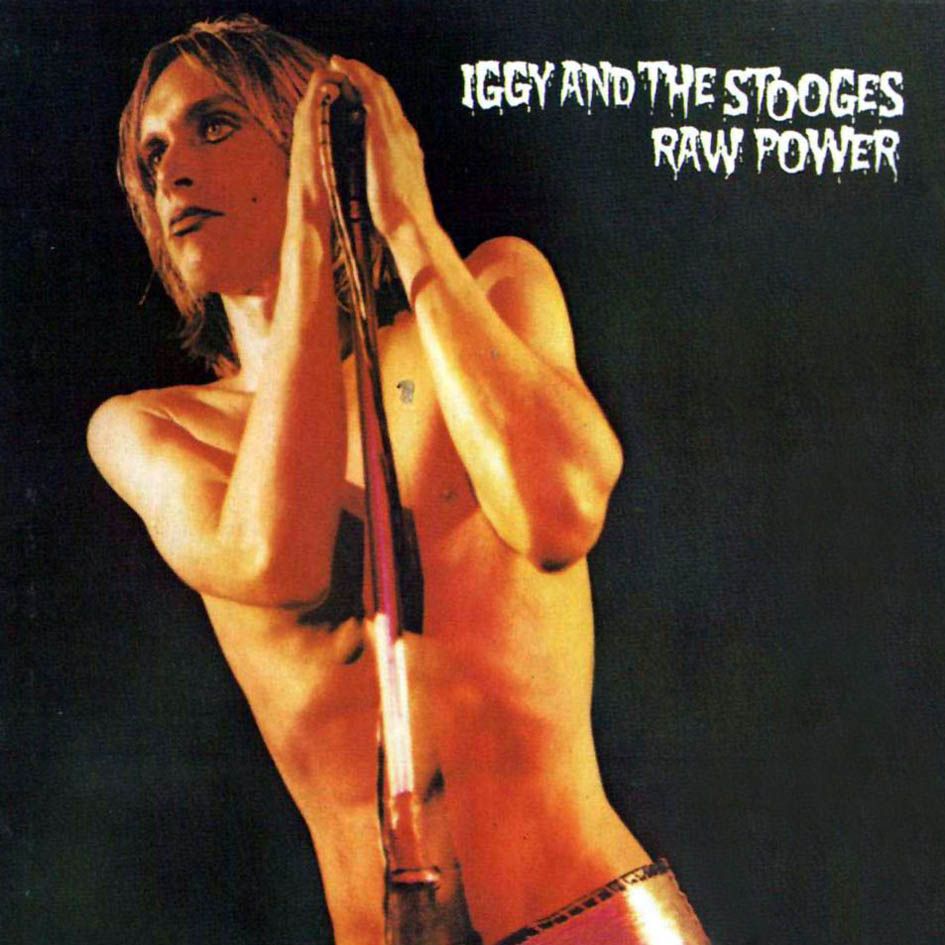
EDITOR’S NOTE: In honor of Iggy & The Stooges playing the House of Blues in Atlantic City on Friday, we have dug into the vaults to retrieve our coverage of the last time they came through town back in 2007. This includes a review of their Electric Factory concert and an in-depth interview with founding member/guitarist extraordinaire Ron Asheton, who sadly passed away in 2009. The current line-up includes Mike Watt on bass (filling in for deceased bassist Dave Alexander), Scott Asheton on drums, and guitarist James Williamson who first replaced Ron Asheton back in the early 70s for the making of the landmark Raw Power album.
CONCERT REVIEW: Gettin’ Iggy With It
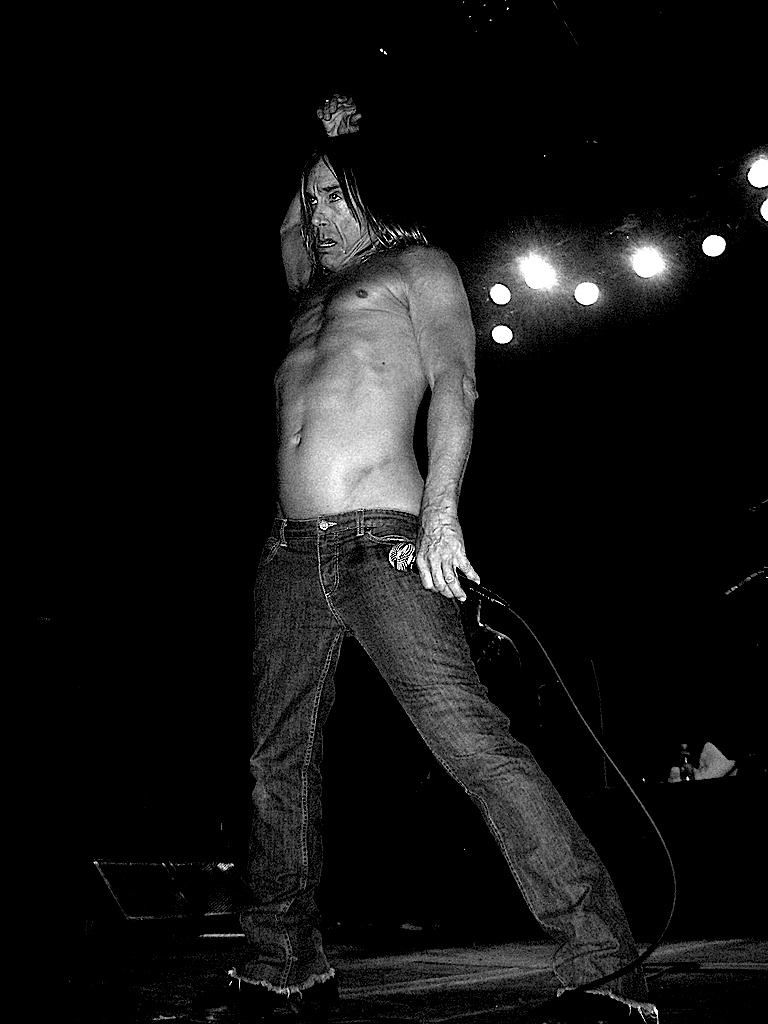
Iggy & The Stooges, Electric Factory, 4/7/07 by Jonathan Valania
 BY JONATHAN VALANIA FOR THE INQUIRER Thanks to the many miracles of our modern affluent society, today’s super-rockers are kicking out the jams longer and harder than ever before. (Think about it: For the better part of the 70s, the smart money would have been on Keith Richards’ dad snorting his son’s ashes, not vice versa.) As Iggy Pop (aka, James Osterberg), who turns 60 next week, proved Wednesday night at the Electric Factory, men well-acquainted with the business end of a sigmoidoscope are still capable of rocking as hard and ferociously as a teenager. They just can’t write like one anymore. The Weirdness, the new album by the reconstituted Stooges, is like an old tin can — jagged, metallic, and its contents long past the Sell By date. But their incendiary live act remains peerless.
BY JONATHAN VALANIA FOR THE INQUIRER Thanks to the many miracles of our modern affluent society, today’s super-rockers are kicking out the jams longer and harder than ever before. (Think about it: For the better part of the 70s, the smart money would have been on Keith Richards’ dad snorting his son’s ashes, not vice versa.) As Iggy Pop (aka, James Osterberg), who turns 60 next week, proved Wednesday night at the Electric Factory, men well-acquainted with the business end of a sigmoidoscope are still capable of rocking as hard and ferociously as a teenager. They just can’t write like one anymore. The Weirdness, the new album by the reconstituted Stooges, is like an old tin can — jagged, metallic, and its contents long past the Sell By date. But their incendiary live act remains peerless.
Loud, lewd and anarchic, The Stooges emerged from the dark side of the ’60s like a bad moon rising, and while they 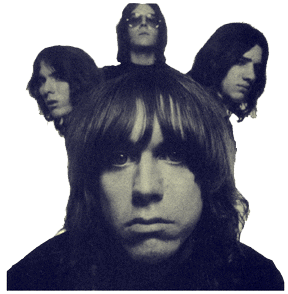 were largely misunderstood if not altogether despised back in the day, both their sound (the prototype of both punk and metal) and vision (hearts full of napalm, 10 soldiers and Nixon coming, apocalypse now) would prove prophetic as the Age of Aquarius curdled into the ’70s. Wednesday night, Iggy and his Stooges — which includes charter members Ron and Scott Asheton on guitar and drums respectively, and ex-Minutemen legend Mike Watt filling in for the deceased Dave Alexander on bass — played like their hair was on fire, opening with Funhouse’s classic one-two punch of “Down On The Street” and “Loose,” and then following it up with “I Wanna Be Your Dog.”
were largely misunderstood if not altogether despised back in the day, both their sound (the prototype of both punk and metal) and vision (hearts full of napalm, 10 soldiers and Nixon coming, apocalypse now) would prove prophetic as the Age of Aquarius curdled into the ’70s. Wednesday night, Iggy and his Stooges — which includes charter members Ron and Scott Asheton on guitar and drums respectively, and ex-Minutemen legend Mike Watt filling in for the deceased Dave Alexander on bass — played like their hair was on fire, opening with Funhouse’s classic one-two punch of “Down On The Street” and “Loose,” and then following it up with “I Wanna Be Your Dog.”
Iggy — the man who no shirt can hold, who more or less single-handedly invented the notion of lead singer as human cannonball — swung his ripped physique about the stage like a bullwhip, while Watt dug in deep, Scott Asheton beat the drums like they owed him money, and brother Ron unloosed his patented six-string cosmic roar. Thuggish new material like “Skull Ring” and “Electric Chair” drew the same crowd response as a dog shown a card trick, but deep-cut selections from the old albums — including a reveletory work-out of Funhouse’s free-jazz double freakout, “Funhouse” and “LA Blues,” accompanied by the hard-bop squawk of charter saxaphonist Steve MacKay — were greeted like conquering heroes. As if to prove that chaos remains his greatest ally, just four songs into the set, Iggy demanded the audience break down the crowd barriers and join him on stage. While the band laid rubber on “Dirt” and “Real Cool Time” upwards of 50 concert goers pogoed and slamdanced on the Electric Factory stage. Which only served to underscore the deathlessness of the Stooges’ prime directive: Rules are made to be broken.
STOOGES: Down On The Street
***
BADMOTORFINGER: Q&A With Guitarist Ron Asheton
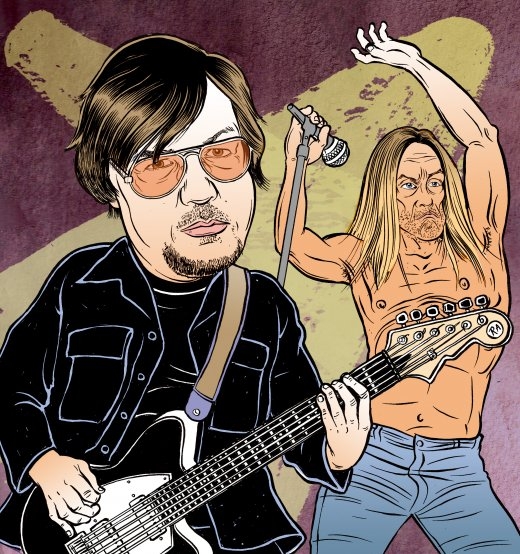
 BY JONATHAN VALANIA Ron Asheton, the original guitarist for the Stooges, is widely regarded as one of the Top 20 guitarists of all time by the people that make such subjective decisions. Recently, Phawker called up Ron and talked about both the ancient and modern history of the Stooges, the needle and the damage done, the stylish evil of Nazi uniforms, how to evade the Viet Nam draft, who gave Iggy the peanut butter and what it feels like to be choked by Bam Margera’s Uncle Vito. The Stooges have reunited — with Mike Watt filling in for the deceased Dave Alexander — and will perform tomorrow at the Festival Pier.
BY JONATHAN VALANIA Ron Asheton, the original guitarist for the Stooges, is widely regarded as one of the Top 20 guitarists of all time by the people that make such subjective decisions. Recently, Phawker called up Ron and talked about both the ancient and modern history of the Stooges, the needle and the damage done, the stylish evil of Nazi uniforms, how to evade the Viet Nam draft, who gave Iggy the peanut butter and what it feels like to be choked by Bam Margera’s Uncle Vito. The Stooges have reunited — with Mike Watt filling in for the deceased Dave Alexander — and will perform tomorrow at the Festival Pier.
RON: I love Philly we were just there for Bam Margera’s wedding.
PHAWKER: I want to talk about that but before we get to the recent past let’s go back to ancient history here. Do you recall the first time you met Iggy — legend has it he saw you and your brother standing outside of the record store that he was working at spitting on people?
RON: Well, no. It was actually my brother, not me. For me, I would see Iggy in the hallway in passing, when he was a junior and I was a sophomore. The high school had a talent show almost every year, so he was in the Iguanas and when I saw them play I was like ‘Whoa!’ It’s in our yearbook, he actually has a big scaffolding set up so he is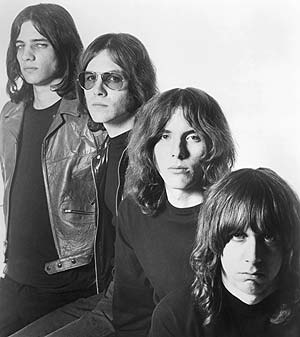 fifteen feet in the air on the drum riser — I don’t know how the hell he heard the instruments playing. But other than that, I would just see him passing in the hallway, and as time progressed, my hair grew — I was the first guy to get kicked out of school for having long hair. I’d see him and he had more of a Beach Boys haircut, ya know the big swept over front. But also he liked being outside and swimming, so it was like sun bleached blonde. So we would just nod, just passing nods, and it was the hip thing to do if you were getting hip, was go into the University of Michigan’s cafeteria, which was only really for students in college. But we would sneak in, and the security guards would come and only make the rounds and then you’d get busted and thrown out. That was really the first time I really spoke with him at any length, cause he was in college and I was still in high school. So one day he stopped and we talked — but the record store, that’s where I really got to know him more. My brother and his buddies used to hang out front, and they weren’t really spitting at people, but they were standing in front, cause that was the best place to hang out. Everyone went to the corner record store, because the management had celebrities in there, like Dionne Warwick came and signed autographs, it was the big deal to have people come and do those little in-stores. I spent a lot of time there, and he saw my brother and some of his bad friends just spitting on the sidewalk, not really spitting on people. But I got roped into it, because someone complained that they actually were spat on and the police came. I just happened to be walking up as the cops came in and I just got lumped in. I went ‘Uh…I wasn’t doing it.’ So we all had to go to the Police station the next day, but I didn’t bother to go, so there was a warrant for my arrest. So, that’s when Iggy really noticed us and started talking to us.
fifteen feet in the air on the drum riser — I don’t know how the hell he heard the instruments playing. But other than that, I would just see him passing in the hallway, and as time progressed, my hair grew — I was the first guy to get kicked out of school for having long hair. I’d see him and he had more of a Beach Boys haircut, ya know the big swept over front. But also he liked being outside and swimming, so it was like sun bleached blonde. So we would just nod, just passing nods, and it was the hip thing to do if you were getting hip, was go into the University of Michigan’s cafeteria, which was only really for students in college. But we would sneak in, and the security guards would come and only make the rounds and then you’d get busted and thrown out. That was really the first time I really spoke with him at any length, cause he was in college and I was still in high school. So one day he stopped and we talked — but the record store, that’s where I really got to know him more. My brother and his buddies used to hang out front, and they weren’t really spitting at people, but they were standing in front, cause that was the best place to hang out. Everyone went to the corner record store, because the management had celebrities in there, like Dionne Warwick came and signed autographs, it was the big deal to have people come and do those little in-stores. I spent a lot of time there, and he saw my brother and some of his bad friends just spitting on the sidewalk, not really spitting on people. But I got roped into it, because someone complained that they actually were spat on and the police came. I just happened to be walking up as the cops came in and I just got lumped in. I went ‘Uh…I wasn’t doing it.’ So we all had to go to the Police station the next day, but I didn’t bother to go, so there was a warrant for my arrest. So, that’s when Iggy really noticed us and started talking to us.
PHAWKER: Tell me about how The Stooges sound evolved. Was there a ‘Eureka!’ moment or did it happen gradually?
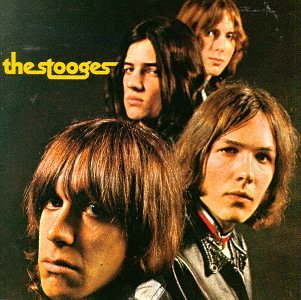 RON: This could be the Eureka moment: As you know, Iggy was a pretty damn good drummer, and I came from a really successful high school band that did covers. I mean it’s pretty amazing when you’re seventeen years old and you’re making a hundred and fifty to two hundred bucks a week, a lot like real people who have real jobs. My brother was just coming up and starting to play. When Iggy quit the drums, he wanted to start a band, so he called us up and said ‘I want to start a band with you and your brother.’ We wanted to do something different, so that was the story of inventing our own instruments. It really started out with Iggy on a Farfisa organ. And one day he sat down, and he came up with a forty-five minute of this very percussive organ music. Being that he was a drummer and not an accomplished keyboardist, he would find some chords that would sound good, he wouldn’t know what they were called, but he would make more Bomp Bomp Daht Daht Bomp Bomp, for example. We’d follow along, with me on bass with a fuzz-tone wah-wah, and my brother on whatever drum set he could borrow, from anyone, or finally making up his own drum set with scraps of metal. We ended up doing the first show with my brother playing fifty-gallon oil drums. But we just plugged along that way, and then Danny Fields discovered the MC5. So he booked the MC5 here in Ann Arbor, Michigan Ballroom, and we played, and he saw us. And he went back to New York and told Jack Holtzman and Bill Harvey: Trust me, sign these guys, trust me, it will work out. But when they did come to Ann Arbor, we were still in more of our jam mode, we didn’t have any proper songs, we would take three pieces of a theme, and just run them together. So I guess that Eureka moment might have been, when we got signed, Elektra was like ‘Well, you do have some songs, don’t you?’ and we said ‘Of course we do!’ So that was our Eureka moment: We gotta write some songs, or we are screwed!
RON: This could be the Eureka moment: As you know, Iggy was a pretty damn good drummer, and I came from a really successful high school band that did covers. I mean it’s pretty amazing when you’re seventeen years old and you’re making a hundred and fifty to two hundred bucks a week, a lot like real people who have real jobs. My brother was just coming up and starting to play. When Iggy quit the drums, he wanted to start a band, so he called us up and said ‘I want to start a band with you and your brother.’ We wanted to do something different, so that was the story of inventing our own instruments. It really started out with Iggy on a Farfisa organ. And one day he sat down, and he came up with a forty-five minute of this very percussive organ music. Being that he was a drummer and not an accomplished keyboardist, he would find some chords that would sound good, he wouldn’t know what they were called, but he would make more Bomp Bomp Daht Daht Bomp Bomp, for example. We’d follow along, with me on bass with a fuzz-tone wah-wah, and my brother on whatever drum set he could borrow, from anyone, or finally making up his own drum set with scraps of metal. We ended up doing the first show with my brother playing fifty-gallon oil drums. But we just plugged along that way, and then Danny Fields discovered the MC5. So he booked the MC5 here in Ann Arbor, Michigan Ballroom, and we played, and he saw us. And he went back to New York and told Jack Holtzman and Bill Harvey: Trust me, sign these guys, trust me, it will work out. But when they did come to Ann Arbor, we were still in more of our jam mode, we didn’t have any proper songs, we would take three pieces of a theme, and just run them together. So I guess that Eureka moment might have been, when we got signed, Elektra was like ‘Well, you do have some songs, don’t you?’ and we said ‘Of course we do!’ So that was our Eureka moment: We gotta write some songs, or we are screwed!
PHAWKER: What was the first Stooges song you guys wrote that saw the light of day?
RON: “I Wanna Be Your Dog”
PHAWKER: Wow, I Wanna be Your Dog was the first song The Stooges wrote?
RON: No, it was the first that was put on a record. The very first song, per se, it might have been, when I look back from the jammy stuff and I think about what the first songs that were written, it could have been wither “Dog” or “No Fun.”
PHAWKER: What sticks out about making the first album with John Cale producing?
RON: Well, it our first time in the recording studio, so it was a little bit intimidating. It was John Cale’s first job as a staff producer for Electra records. So it was only fitting that we liked the Velvet Underground and he would be our producer. So I remember you had to walk up the little stairs to get to the studio — down below the studio was a peep show and porn magazine shop. You put your quarter in and the little thing goes up and you got thirty seconds of some not -too attractive woman. But anyways, it was a little hit factory, and they mostly did R&B stuff out of there. It was a little rectangle and we brought in our Marshall Stacks — the first Marshalls were really tall. So we were used to playing that way, we compensated for our inability to master our instruments with volume. So that was how we were grooming our style: the power chords, the volume.
PHAWKER: So you guys used those big amps to record the first album?
RON: Yeah, and my first impression was John Cale going like ‘Hey, wait a minute, this isn’t how it’s done, you don’t have Marshall stacks set on ten in the studio.’ So we had a sit down strike, and that is what I remember most of that recording.
PHAWKER: Oh right, so how long did that last?
RON: Oh, no more than an hour, he would come in and tell us how foolish we were. But what did we care? We’re young, we’re brash, we’re The Stooges! So the compromise was we would turn our amps down to nine, so once we got over that it worked out well. He just baffled amps a little more so that there wasn’t a lot of bleed. And we thought, ‘wait bleed that’s good, isn’t it? Because then we are drifting into each others sounds and so it’s gonna make it bigger.’ We didn’t know much, but it was cool.
PHAWKER: “We Will Fall,” was that just made up in the studio or was that already written?
RON: It started as a chant. [Bassist] David Alexender was into Buddhism and transcendental meditation. So we had this chant: Ohm Schiwm Rahm Jadh Rahm Jadh Jadh Rahm. When I first did it with him he said ‘Keep doing it, it will really make you high.’ And though I could sing anything for an hour and get dizzy, we really liked it, and we needed some material, so it became his contribution. It was made up right on the spot with tape rolling. Basically, we sat in a little room with candles and incense and just did that chant. Then I went back and did the guitar and the bass stuff and it was all pieced together. I was really happy when John Cale decided he was going to put the viola over it, for me that really makes it, that sad coming in at the end. That’s one of those songs that, you either hate the shit out of it, or you think its cool.
PHAWKER: One last question on Cale, where you aware of The Velvet Underground or fans?
RON: Oh yeah, we played the stuff all the time. We had the banana record.
PHAWKER: So you were pretty psyched about having him produce you guys?
RON: Oh yeah, I don’t know how exciting it was for him as his first assignment, but we sure were excited by it. Iggy had actually seen the Velvets play when they were in Ann Arbor.
PHAWKER: Let’s jump ahead, Fun House, what sticks out?
RON: For me? Wow, Los Angeles is the first thing that comes to mind. I’ve always been a giant fan of movies, I love movies, and we’re gonna be in Hollywood, California making a record! We were well prepared this time, and that’s the other thing that jumps to mind. We had just come off the road. [Producer] Don Galluci came to see us play and he said he wanted to record our live show. All we did was switch a couple songs around, but just played our live set.
PHAWKER: Had you not been to Los Angeles before?
RON: No, had never been.
PHAWKER: And this is what 1968 or 69?
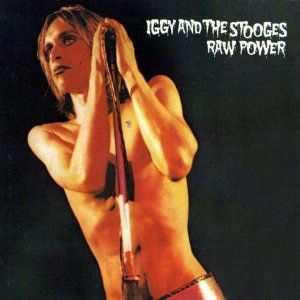 RON: It would be, cause we had the song 1970, it was late ‘69 and I think it was September. It was shortly after the Manson Murders, so that was the big deal.
RON: It would be, cause we had the song 1970, it was late ‘69 and I think it was September. It was shortly after the Manson Murders, so that was the big deal.
PHAWKER: Was that hanging over everything you did out there?
RON: Oh yeah, but no one was dwelling on it, obviously we cared that people got murdered. They had caught him already. It was still, like that old saying, the end of the Summer of Love or whatever.
PHAWKER: Did that give you guys pause. Did it occur to anyone back then that this is what happens if you take these notions of personal freedom and drug culture, and pervert it, this is what you get? And we need to watch out for that?
RON: Well, we didn’t and look what happened. Iggy became a junkie, my brother became a junkie, I never touched the stuff myself.
PHAWKER: Heroin?
RON: Yeah, heroin.
PHAWKER: You guys were all psychedelics and chanting, what happened?
RON: Honestly, by then, I had been through all that already. Iggy carried on with acid for years after that, I was surprised when he told me he had done every show on acid — he only told me this three years ago. I knew he was taking stuff, but not every show. For me, I had gone through all that stuff and by that point was just smoking pot. But it’s true, that kinda was the beginning of the end. Once the simple marijuana sold by the hippie got recognized by the gangster, making it a big business by bringing in many hundreds of pounds of it, instead of just the hippie down the street who had a key, that you go and get a dime bag from, that’s when it started going south.
PHAWKER: Tell me the story about the time you guys drove the band truck under the bridge that was too low and sheared off the top of the truck…
RON: Well, that was is my brother, again. We had this roadie, whose father owned a U-Haul rental place. So we got a truck. My brother did not have a driver’s license, and of course he’s driving, and this is funny cause about a month ago somebody just did it again, and it was in the Ann Arbor news. Every few years someone goes under that bridge, it’s well posted at being only nine and a half or ten feet, it’s a railway bridge. My brother just didn’t know, he was having fun, not paying attention, and BLAMMO it peeled the top back, lifted the truck back up and, I found out by a police call, and I went to the hospital, and they were all acting super serious. Oh Shit, this is really bad, I’m thinking. The nurse kept going, this is really bad, its really bad. So I’m freakin’ out and so I start calling everyone and warning everyone to prepare for the worst. And so I come back out and there they are, my brother bit a hole through his tongue, the other guy busted through the windshield and busted all his teeth, the third guy hit the windshield and had a big split in his head. The cops arrested two of them, but let my brother go. And we never made it to the show
PHAWKER: And then, can we talk about how James Williamson becomes guitar player and you move to bass?
RON: I met James Williamson at the first show I did with my high school band, The Chosen Few. They were all from Birmingham, Michigan, and I’m from Ann Arbor, Michigan, and that’s what, about fifty miles away. I met the singer Scott Richardson through Iggy, when Iggy worked at the record store. Iggy called up and said ‘Hey, there’s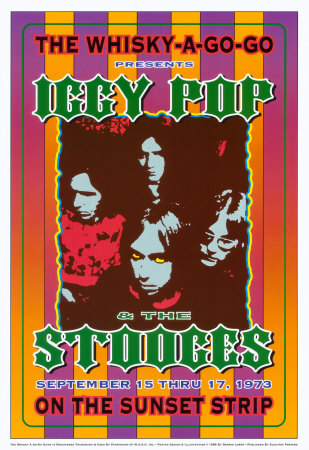 this guy here looking for a bass player.’ So Iggy actually hooked all that up. Spent the day talking to him, got the job, went back, did rehearsals, met James Williamson. James Williamson was shipped off after that, to school in New York. So years later, we decided it might be fun to have another guitar player. We auditioned a lotta crappy people, guys that were good, but they weren’t anywhere near the Stooges style. I mean you don’t have our primitive stuff with somebody playing, like, Foghat guitar, Lynyrd Skynyrd guitar. I mean, they were probably way better guitar players than I. But then I heard that somehow James found us. That he was in town. He came by, and we played with him, and he was more accomplished technically than I, but he still had a primitive style. I thought yeah great, so I started working with him, but unfortunately this was the junkie times, so. Iggy sorta buddied up with him, because they were junk buddies, and that’s how we got involved with him taking over my position. The band just went down hill fast with James and that was the end. When the band broke up, they were still kinda junk buddies. So Iggy quit everything, he cleaned himself up and went to New York, met David Bowie, Bowie was an Iggy fan. Bowie took him to Main Man Management who in turn took Iggy to Clive Davis at CBS who gave him a record deal — and the plan was to record an album in England [which became Raw Power]. So Iggy had James come along to England with him. I guess they were there for several month’s before I got that phone call, it was Iggy and he said ‘Well, we’ve auditioned a hundred and fifty bass players and drummers and we don’t like any of them. Would you and your brother come over, but I want you to play bass, cause we cant find anyone.’ So I didn’t even question that one, I wasn’t doing anything, so I was like, ‘Yeah let’s go!’ So I wound up going, with the promise that eventually I would play guitar again — but that’s not what James wanted. And once again, the band just took its merry course right down hill.
this guy here looking for a bass player.’ So Iggy actually hooked all that up. Spent the day talking to him, got the job, went back, did rehearsals, met James Williamson. James Williamson was shipped off after that, to school in New York. So years later, we decided it might be fun to have another guitar player. We auditioned a lotta crappy people, guys that were good, but they weren’t anywhere near the Stooges style. I mean you don’t have our primitive stuff with somebody playing, like, Foghat guitar, Lynyrd Skynyrd guitar. I mean, they were probably way better guitar players than I. But then I heard that somehow James found us. That he was in town. He came by, and we played with him, and he was more accomplished technically than I, but he still had a primitive style. I thought yeah great, so I started working with him, but unfortunately this was the junkie times, so. Iggy sorta buddied up with him, because they were junk buddies, and that’s how we got involved with him taking over my position. The band just went down hill fast with James and that was the end. When the band broke up, they were still kinda junk buddies. So Iggy quit everything, he cleaned himself up and went to New York, met David Bowie, Bowie was an Iggy fan. Bowie took him to Main Man Management who in turn took Iggy to Clive Davis at CBS who gave him a record deal — and the plan was to record an album in England [which became Raw Power]. So Iggy had James come along to England with him. I guess they were there for several month’s before I got that phone call, it was Iggy and he said ‘Well, we’ve auditioned a hundred and fifty bass players and drummers and we don’t like any of them. Would you and your brother come over, but I want you to play bass, cause we cant find anyone.’ So I didn’t even question that one, I wasn’t doing anything, so I was like, ‘Yeah let’s go!’ So I wound up going, with the promise that eventually I would play guitar again — but that’s not what James wanted. And once again, the band just took its merry course right down hill.
PHAWKER: So just to close the book on Stooges’ history, would you say heroin played a major role in the band’s demise?
RON: Yeah, both times. Good brother H, shuttin’ the Stooges down twice. Also, they found out it was easier to score opiates in England; you can just go to the corner pharmacy and get codeine, right over the counter. So I noticed a lot of codeine being eaten during the Raw Power sessions.
PHAWKER: So lets jump ahead, tell me how the reunion came about?
RON: Well it started out, again, with another call from Iggy. And I hadn’t spoken with him in twenty-five years. It was, ‘Are you interested in doing a project, you and your brother?’ and here we go again. He goes, ‘I’m doing this project, I’m doing a CD, and I’m having different people play,’ and I’m going ‘Yes Sir I want to do it man, absolutely. So it wound up being really fun and became Skull Ring. We went down to Miami, and he said ‘You can come with music, or come without.’ So I said, ‘I’m going down with no music, we can create something down there.’ Wound up, the night before, coming up with the riff that became Skull Ring, so I had an icebreaker. So we went through recording process, and while we were mixing Iggy walked in and said, ‘My Management is getting calls, people have heard that we’re together, we’re playing. There are offers to play.’ And that was the Coachella show. He didn’t really want to do it, he didn’t really like reunion stuff, and I understand that. But there was enough pressure and guilt-tripping applied by me and my brother that he finally goes, ‘Oh Ok’. Then it was the battle of finding the bass player, he wanted Pete Marshall and I had been playing with Mike Watt. Mike Watt knows all The Stooges songs, plus he sang them. I didn’t feel like teaching Pete Marshall all the songs, so I got my way. We played the show and then afterwards, we’re in the trailer and I go ‘This is great.’ I’m looking at the big spotlights and lights and the music and I’m going ‘Wow, I guess this is the reunion, cool, maybe something will come out of it.’ That I might get somebody to let me start my band again, and go out and play again. After our set, Iggy goes up to Mike Watts and he goes, ‘Hey, would you be available for more shows this year?’ I went, YES! He liked it! And the offers came pouring in and we’ve been just rolling on our merry way ever since.
PHAWKER: Tell me about the new album, what was the goal and what was the strategy to get there?
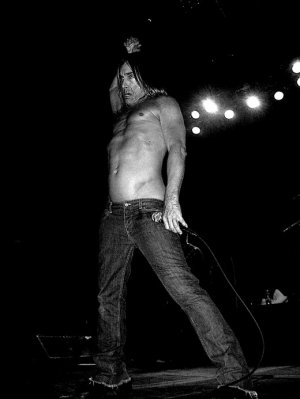 RON: Well, pretty much, we didn’t think really hard about anything. When we first got back together we would get together three or four times a year, for five six days a week, and about seven hours a day. I’d just walk in and start playing guitar, Iggy hears something he likes he just goes ‘Keep playing that, find another piece for it.’ I keep playing it, he comes back in, we’d tape it and smash something together. He’d sing over it, so we’d go ‘Ok heres one.’ So we wind up doing forty-two pieces of music and we were really enjoying playing together. I thought also, don’t jump the gun, don’t jump the gun, just go out, make a little splash, and get some people excited. We’ll make a record someday. We never talked about it, never talked about it. And then one day he goes ‘Ya know, we’re gonna make a record.’ So it wound up being the most fun of any recording session I’ve ever done, even though I enjoyed the others for they were. This was fun because, we walked out of there everyday, we did two songs everyday. And that was live, Iggy sang live with the band. Pretty much, that’s what’s on the CD. This time, we were the producers, we were the ones doing it. We were the ones working with the great engineer Steve Albini. So it was way fun and way different, and it felt natural, everything just fell in line. Now we’re about to go out and promote it. We we were just in France.
RON: Well, pretty much, we didn’t think really hard about anything. When we first got back together we would get together three or four times a year, for five six days a week, and about seven hours a day. I’d just walk in and start playing guitar, Iggy hears something he likes he just goes ‘Keep playing that, find another piece for it.’ I keep playing it, he comes back in, we’d tape it and smash something together. He’d sing over it, so we’d go ‘Ok heres one.’ So we wind up doing forty-two pieces of music and we were really enjoying playing together. I thought also, don’t jump the gun, don’t jump the gun, just go out, make a little splash, and get some people excited. We’ll make a record someday. We never talked about it, never talked about it. And then one day he goes ‘Ya know, we’re gonna make a record.’ So it wound up being the most fun of any recording session I’ve ever done, even though I enjoyed the others for they were. This was fun because, we walked out of there everyday, we did two songs everyday. And that was live, Iggy sang live with the band. Pretty much, that’s what’s on the CD. This time, we were the producers, we were the ones doing it. We were the ones working with the great engineer Steve Albini. So it was way fun and way different, and it felt natural, everything just fell in line. Now we’re about to go out and promote it. We we were just in France.
It was great, man, great crowds. I mean, it’s a celebration of music, everyone’s partying. But for me, the highlight was during South by Southwest. [Sex Pistols guitarist] Steve Jones had a little radio show broadcast at the Levi store. So we’re doing our show, and I’m looking at Steve Jones and Iggy talking, and my brother kicks me really hard, I go ‘Goddammit!’ And he’s looking up and to my right and its Pete Townsend! He was there to do an interview after us. But he heard we were there and he wanted to meet us. Can you imagine? Sitting across from Pete Townsend, no more than three feet away! Him saying good things about you, one of your idols is saying how great you are, how he admires The Stooges and really he likes the music. That was one of the highlights of my life.
PHAWKER: You are a collector of Nazi paraphernalia right?
RON: Well I collect all types of military stuff, I love all kinds of military history. I just got finished with a year’s worth of concentrating on Vietnam, because I had two friends and one acquaintance that were killed there. It’s the war I didn’t go to.
PHAWKER: How did you avoid going to Vietnam?
RON: I told them I was a neurotic, drug addicted, homosexual.
PHAWKER: That worked?
RON: Yeah, everyone just lied, but I won the Academy Award — I was the only one that got 4F, everyone else just got 1Y, but I got my 4F.
PHAWKER: What does that mean, that they could still get called up?
RON: In extreme national emergencies you can be re-evaluated. 4F is unacceptable for military service at any time.
PHAWKER: You used to wear some of your Nazi getups during your Stooges shows, correct?
RON: I did a few times during the beginning, like I’d just wear a belt or put a little pin on my collar. And in the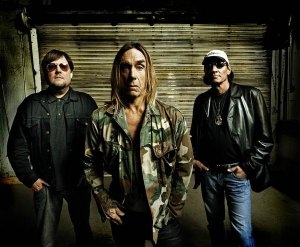 crazy Raw Power times, I had this black coat, but I had my girlfriend cover up the swastika armband, cause I couldn’t go out there with a big swastika armband on. I just liked the coat because, to me, it just looked really cool, it was a black SS coat. I’m a big admirer of Brian Jones and remember that famous picture of him with his jackboot on the baby doll, but everyone was just totally shocked. One night Iggy just ripped that black velvet arm band off, and I’m going ‘Well OK, I’ll stop.’ The reaction was mixed, and that’s not what we represent, and that’s not what music’s about. So it was more of just shock value, it wasn’t meant to make any political statements. Iggy’s wearing makeup, James has eight-inch platform shoes. It was just my way of expressing myself.
crazy Raw Power times, I had this black coat, but I had my girlfriend cover up the swastika armband, cause I couldn’t go out there with a big swastika armband on. I just liked the coat because, to me, it just looked really cool, it was a black SS coat. I’m a big admirer of Brian Jones and remember that famous picture of him with his jackboot on the baby doll, but everyone was just totally shocked. One night Iggy just ripped that black velvet arm band off, and I’m going ‘Well OK, I’ll stop.’ The reaction was mixed, and that’s not what we represent, and that’s not what music’s about. So it was more of just shock value, it wasn’t meant to make any political statements. Iggy’s wearing makeup, James has eight-inch platform shoes. It was just my way of expressing myself.
PHAWKER: What do you recall from the infamous Cincinnati show with the peanut butter…
PHAWKER: I mostly remember that I did not see the peanut butter stuff, cause I was mostly worried about playing. And the film crew who was filming it hooked their cords into my effects pedals, and were literally dragging my stuff across the stage. And I’m worried that its going to be unplugged, and I really have no one to help me of any competence. I’m just following the camera crew across the stage. Stiv Baters said he was the one who gave Iggy the peanut butter.
PHAWKER: Someone in the crowd out there had peanut butter you mean?
RON: Yeah, he had it just to eat. He was just eating it and he just held it up. It was just one of those things, I don’t think he consciously thought of what would even happen with it, it was just one of those magic moments.
PHAWKER: Wow, I didn’t know it was Stiv who handed it to him.
RON: Stiv said it was him. He always said, I gave Iggy the peanut butter. He just wound up smearing on him.
PHAWKER: That sounds like the name for a great memoir, I Gave Iggy the Peanut Butter.
RON: Yeah, you cant believe how that story and the legend of peanut butter carries on, What was in our dressing room in South by Southwest? Peanut butter, jelly and bread.
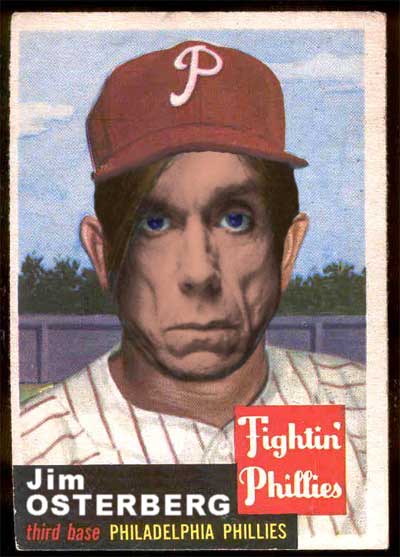
PHAWKER: Regarding the live show, you guys are going to be playing some of the new album, but you are gonna be rolling out a lot of the old stuff too, right?
RON: Oh its gonna be a long set. We’re still doing all of the old songs. The stamina is amazing, especially for my brother. We just slap them songs right out.
PHAWKER: How old are you?
RON: I’m 58.
PHAWKER: And your brother?
RON: He’s 57.
PHAWKER: And Iggy?
RON: He’ll be 60 in April. And he’s more energy than ever. If anything, to me, there more so than the past.
PHAWKER: Well, he’s probably in better shape.
RON: He’s drug-free. For him, a big night is two glasses of wine. After the show, he has one glass and then off to the hotel room. He swims, he does his Tai Chi, now it’s business, and we’re having the best time getting to play and to be together. Being able to hang out with my brother is one of the highlights of getting the band back together, after not seeing him hardly at all for many years. I have friends that are like, what do you mean you haven’t seen your brother in five years, ‘Well he lives in California and I live in Michigan and he doesn’t have the money and neither do I.’ That’s why it’s just fun now to hang out and be with everyone.
IGGY & THE STOOGES PLAY THE HOUSE OF BLUES IN ATLANTIC CITY ON FRIDAY
